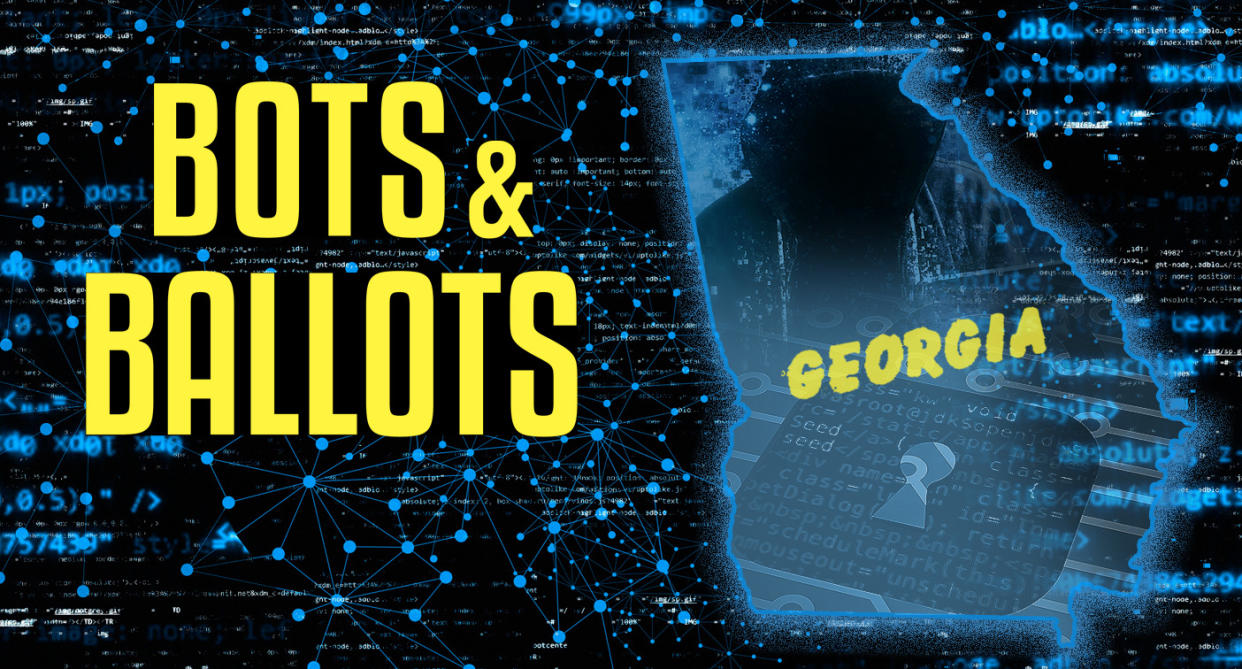State under fire over vulnerable voting machines

SAN FRANCISCO — When it comes to election interference in the 2018 midterms, critics say Georgia is ripe for the picking.
The state uses dubious electronic voting machines that offer no paper backup so as to detect foul play, and have been shown to be easily penetrated.
“These are old school voting systems. I call them old school because they are one of the few systems in the country that still don’t have a paper trail on them,” freelance journalist Kim Zetter told Grant Burningham, host of Yahoo News’ “Bots & Ballots” podcast.
“So these are what are called direct recording electronic [DRE] machines. They’re touch screen machines. They were made initially by Diebold, and Diebold, if you’ll recall, had a lot of bad publicity back in 2004, 2005, when the source code for their touchscreen machines was exposed online, and researchers looked at it and found a lot of problems.”
Zetter, the author of “Countdown to Zero Day: Stuxnet and the Launch of the World’s First Digital Weapon,” has spent years studying system vulnerabilities, and she sees Georgia as a prime target for those seeking to disrupt U.S. elections. According to the New Yorker, Georgia is “one of only five states that uses voting machines that create no paper record.”
Download or subscribe on iTunes: “Bots & Ballots” by Yahoo News
“As other states realized the security problems with machines, particularly DREs, they passed legislation that required paper trails to be added to the machines,” Zetter said. “Georgia has very stubbornly resisted that.”
As special counsel Robert Mueller’s recent indictment of Russian intelligence officers alleged, the operatives “identified vulnerabilities” in Georgia’s electoral system, and many experts agree that the state could be compromised in the midterms.
David Cross, a lawyer representing state residents suing to force Georgia to return to paper ballots for the midterms, also said the current system isn’t trustworthy.
“There is every reason to believe that Georgia voters will be susceptible to hacking if they don’t get some sort of verifiable system which necessarily involves paper ballots,” Cross told “Bots & Ballots.”

Through a statement from his office, Georgia Secretary of State Brian Kemp, who is also the Republican nominee for governor in the 2018 election, downplayed fears over vote tampering.
“Georgia’s election system is secure, and we continue to work with local, state, and federal officials on election security to maintain and preserve the integrity of our electoral process.” Candice Broce, Kemp’s press secretary said in an email. “There is no evidence that any component of the election system has ever been compromised.”
As he awaits a federal judge to rule on the motion to scrap the Diebold voting machines this year, Cross contended that the threat to Georgia’s upcoming election is real.
“The state likes to treat our concerns, as it calls them, as hypothetical, characterizes our clients as paranoid,” Cross said. “Our concerns are shared at the highest levels of the government, the U.S. Senate Select Committee on Intelligence has encouraged that these types of machines be eliminated.”
Zetter points out that absent a paper record to tally actual votes, an attack on the system may simply go unnoticed. To her mind, Georgia is making it too easy for bad actors to test the limits of their ability to interfere with American democracy.
“The systems in Georgia run on the Windows operating system, and that’s not a sophisticated system. It’s a system that everyone has on their laptop that you can study,” Zetter said, adding, “The question here is just access. The ability is there. Obviously, the will is there. The Russians have shown us that. All that’s left now is whether or not machines are secured enough to prevent this, and also designed well enough to detect it if someone does subvert a machine. And I would say that the answer on both of those counts is no.”
More “Bots & Ballots” episodes from Yahoo News:
Facebook is a surveillance system, author Cory Doctorow says
Meet the man behind the new, pro-Trump Russian website in the U.S.
Ex-NSA official: Russian hack of Democrats was ‘assembly line operation’
Ex-Twitter exec: Trump is in denial over social media threat to midterms
How Trump weaponized fake news — and changed the rules for fact checkers
Bots are poised to wreak havoc on the 2018 midterm elections



